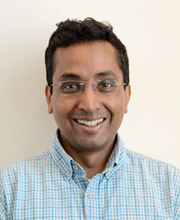Sharad Ramanathan, Ph.D.

Sharad Ramanathan studies how multi-potent cells make developmental decisions and how the nervous system makes behavioral decisions.
Our laboratory focusses studying how multi-potent cells make developmental decisions and how the nervous system makes behavioral decisions.
We ask how multi-potent cells receive and process signals to build correctly patterned complex tissues of the correct size. Further, we ask how the underlying signaling pathways and gene regulatory networks evolve to produce novel cell types and whether we can take advantage of this evolutionary history to re-engineer these networks. Our final goal is to demonstrate our understanding by patterning and building tissues. Our experiments focus on early human development.
We ask how nervous systems process environmental signals to determine animal behavior. We aim to dissect the nervous system to identify key nodes in the network and demonstrate our understanding by taking control of the animal’s behavior by directly manipulating neural activity. Our experimental focus is on the nervous system of the nematode C. elegans.
We bring together developmental biologists, cell biologists, neurobiologists, physicists, and bioengineers to achieve our goals.
Biosketch
Ramanathan is the Llura and Gordon Gund Professor of Neurosciences and of Molecular and Cellular Biology and Professor of Applied Physics and of Stem Cell and Regenerative Biology, and Co-Director of the Quantitative Biology Initiative at at Harvard University. Ramanathan received his Ph.D. in Chemical Physics from Harvard University and his undergraduate degree from the Indian Institute of Technology, Kanpur. He was a member of technical staff in the Theoretical Physics Department at Bell Laboratories before moving back to Harvard. He is a member of the Department of Molecular and Cellular Biology, and of the Applied Physics Division in the John A Paulson School of Engineering.
